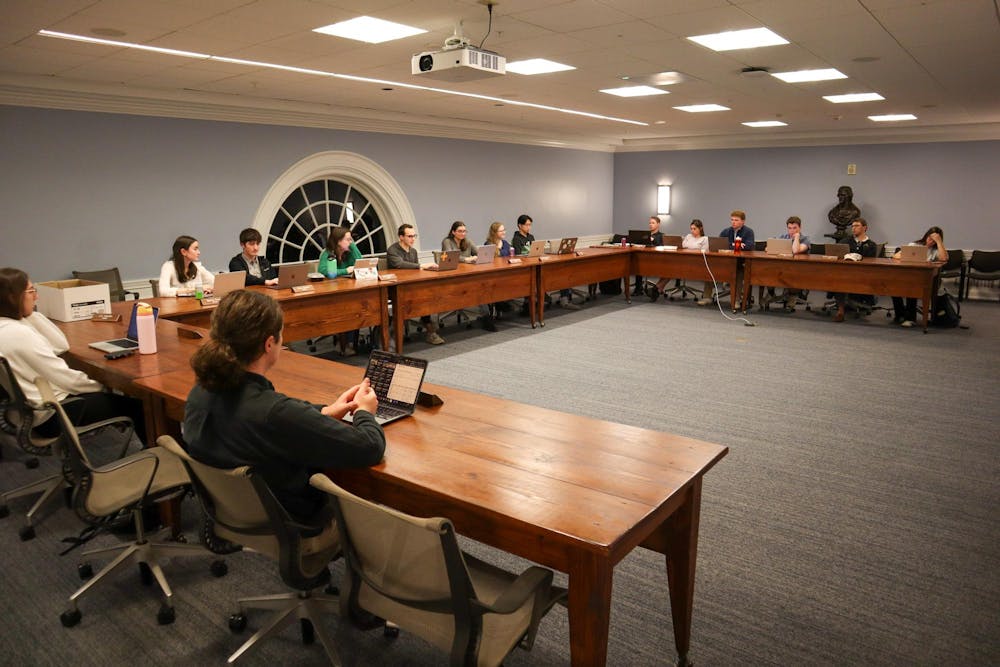During Sunday’s Honor Committee meeting, members discussed expanding outreach to students through a series of events across the University ahead of finals week, as well as increasing the Committee’s social media presence. The Committee also considered revisiting its sanctioning procedures for students found responsible for repeated honor violations.
As finals season approaches, the Committee is pushing to host a series of events across various schools at the University. These events range from tabling outside of academic buildings to engage students in discourse about Honor to bringing in graduate students to host help sessions on challenging topics within their respective schools.
Ryan Dallas, Data Science representative and graduate student, shared some plans for Honor events, includig inviting in a therapy dog, promoting the use of professor office hours and bringing graduate students to the school to host peer review sessions with undergraduate students.
For the College of Arts and Sciences, Genny Freed, vice chair for sanctions and third-year College student, shared that she and the other College representatives plan to set up a hot chocolate bar for students to grab before their finals. The College representatives also hope to hand out exam-related materials, such as blue books, or other wellness-related resources for students before their exams.
Gabby Bray, law school representative and Law student, discussed plans to table at the School of Law during final exams, so she and other Honor representatives can meet with students, answer questions about Honor at the University and hand out coffee and pastries to students before their exams.
Following reports from the various school representatives, the Committee opened a conversation on potentially adjusting the bylaws to specify whether students are still entitled to an Informed Retraction if they were sanctioned to expulsion in abeyance by the Honor Committee in a previous case.
An Informed Retraction allows an accused student to accept responsibility for an Honor violation and avoid permanent sanctions, provided they meet specific conditions. A sanction held in abeyance is a prior sanction — such as expulsion — that is shared with a future panel if the student faces another hearing. The new panel receives the previous recommendation but retains the ability to determine the final sanction.
Freed noted that the potential change would mean that an accused student's previous sanction in abeyance would be deemed an illegitimate sanction if the student were to use their one permitted IR in a second case.
“If a student had just gone through a hearing … and [is] sanctioned [to] expulsion in abeyance, and then gets reported a second time and goes to an IR, that sanction [as recommended by a previous panel of sanctions] technically couldn't be implemented,” Freed said. “I would, as of now, potentially be in favor of having something that says the expulsion in abeyance should overrule IR protection for expulsion.”
Alexander Church, Engineering school representative and fourth-year Engineering student, said he believes that this type of change would need to be a constitutional amendment, which would add another layer of complexity to the proposal, as a constitutional amendment requires a 3/5ths vote, by at least 10 percent of the eligible student voting population, which an amendment to the bylaws does not require.
Cody Scarce, vice chair of investigations and third-year College student, said he is more apprehensive about infringing on a student's right to an IR.
“I am initially hesitant to think about overriding a student's guaranteed right to a single IR due to an abeyance sanction,” Scarce said. “I think we should consider the fact that IRs are supposed to be honored as the removal of all permanent sanctions, regardless of what previous sanctions might have been … regardless of when they use it throughout their time at the University.”
Another major talking point was the Committee’s push to improve its social media presence and better engage students and the greater University community. They specifically mentioned hoping to increase their use of Instagram Reels and increase their coverage of events on their social media platforms.
Scarce, who is also the community relations and diversity advisory subcommittee chair, shared that through social media, the Committee is hoping to increase its presence as real students and members of the University community rather than simply an organization.
“We want to make ourselves really approachable and forward-facing for the University. [We hope to make the University community] see us more as people, and less as some entity at the University that just works behind the scenes,” Scarce said.”
The Committee will be hosting its next meeting on Sunday at 7 p.m. and is currently planned to be held only over Zoom rather than in-person. The Zoom links for Honor meetings are posted on their website. Students are able to attend meetings if they wish and are free to ask questions or provide comments to the Committee during the public comment section of each meeting.







